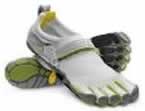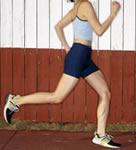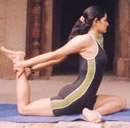Running
"Life is short...running makes it seem longer"
Baron Hanson
 Running is as simple as putting one foot in front of the other, yet it\'s health benefits are amazing. Not only is running great for your cardio/pulmonary system (heart & lungs) it also helps regulate hormone function, fat burning, bone density and also helps with mood elevation.
Running is as simple as putting one foot in front of the other, yet it\'s health benefits are amazing. Not only is running great for your cardio/pulmonary system (heart & lungs) it also helps regulate hormone function, fat burning, bone density and also helps with mood elevation.
There are a lot of myths out there about running, one in particular is that the constant pounding will increase joint wear and tear. A recent study has shown almost the opposite. Not only was there minimal to no joint changes between runners verses non-runners, there were unexpected benefits. For the full article: run study
Frequently Asked Questions
Barefoot running - is it for me?
-
 Minimal support or barefoot running has become popular in the past few years. Is it for you? The research results seem to indicate that if you\'re very careful you might be able to transition to minimal support running with minimal likeyhood of injury. It does seem that minimal support running may be less stressful to lowerlimb and low back joints thereby decreasing stress loads and injuries to these regions. The key here is, if you want to transition, do it slowly! It would be a good idea to have a professional who is familar with running to guide you through this transition.
Minimal support or barefoot running has become popular in the past few years. Is it for you? The research results seem to indicate that if you\'re very careful you might be able to transition to minimal support running with minimal likeyhood of injury. It does seem that minimal support running may be less stressful to lowerlimb and low back joints thereby decreasing stress loads and injuries to these regions. The key here is, if you want to transition, do it slowly! It would be a good idea to have a professional who is familar with running to guide you through this transition.
When Should I Run?
-

 Anytime, however early morning running should be done with a bit of caution. After a full nights sleep the lubrication of most joints has decreased somewhat and the joints can be a bit tighter. It\'s a good idea to be up and about for at least 20-30 minutes after getting out of bed before you start running. Once started run at a pace that would be a little slower than a warm up, just until you feel you\'re moving freely, then resume to your normal pace.
Anytime, however early morning running should be done with a bit of caution. After a full nights sleep the lubrication of most joints has decreased somewhat and the joints can be a bit tighter. It\'s a good idea to be up and about for at least 20-30 minutes after getting out of bed before you start running. Once started run at a pace that would be a little slower than a warm up, just until you feel you\'re moving freely, then resume to your normal pace.
How Should I Run?
-
 As in all activities your posture while running is very important. To facilitate upright posture make sure you\'re looking straight ahead at the approaching horizon. Keep your shoulders relaxed and let your arms swing front to back not across the body. For longer distances sometime shortening your stride length helps in keeping your energy expenditure lower as you\'re not having to lift your knees as high. The most important thing is to run relaxed, make sure you\'re not hiking your shoulders up to your ears.
As in all activities your posture while running is very important. To facilitate upright posture make sure you\'re looking straight ahead at the approaching horizon. Keep your shoulders relaxed and let your arms swing front to back not across the body. For longer distances sometime shortening your stride length helps in keeping your energy expenditure lower as you\'re not having to lift your knees as high. The most important thing is to run relaxed, make sure you\'re not hiking your shoulders up to your ears.
What About Stretching?
-
 There still is a bit of controversy regarding when is the best time for stretching. It seems clear that flexible muscles are least likely to be injured and perform the best. The research indicates that too much stretching before exercise might elongate the muscle so that it loses some of it\'s strength for the activity, thus the possibility of injury. Warming up before running should consist of easy running until you start to breathe a little harder and your body temperature is slightly increased. Stretching after activity is highly recommended ideally focusing on the legs and lower back. Stretching should also be done as a completely separate activity so as to increase you general flexibility.
There still is a bit of controversy regarding when is the best time for stretching. It seems clear that flexible muscles are least likely to be injured and perform the best. The research indicates that too much stretching before exercise might elongate the muscle so that it loses some of it\'s strength for the activity, thus the possibility of injury. Warming up before running should consist of easy running until you start to breathe a little harder and your body temperature is slightly increased. Stretching after activity is highly recommended ideally focusing on the legs and lower back. Stretching should also be done as a completely separate activity so as to increase you general flexibility.
What Should I Eat?
-
 In today\'s convenient world it is easy to ingest all your nutrient needs in bars and fortified drinks. However, it still appears that ingesting these nutrients from foods my actually be better for you. As a runner you should insure to eat a very balanced and healthy diet. Some of the main ingredients should include:
In today\'s convenient world it is easy to ingest all your nutrient needs in bars and fortified drinks. However, it still appears that ingesting these nutrients from foods my actually be better for you. As a runner you should insure to eat a very balanced and healthy diet. Some of the main ingredients should include:- whole grains
- 5 - 7 servings of different fruits and vegetables/day
- dairy products
- lean meats, poultry and eggs
- fish, especially cold water varieties
How Often Should I Run?
- Running frequency is very specific to the individual. If you are new to the sport, running every other day until your body adjusts to the new activity is very important. Depending on your age, current health status, previous running experience, this beginning stage can last anywhere from one to six months or even longer. It is not unheard of for some to train on a daily basis with only the occasional day off. Of course you must be in very good shape and pay particular attention to how your body is feeling and make sure you give yourself enough time to recover from the previous training session.
Before partaking on any new exercise plan it is highly recommended to consult with your health care professional. All the information presented is purely that - information- it is not to replace any professional advice.
